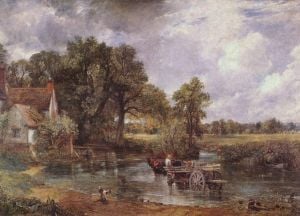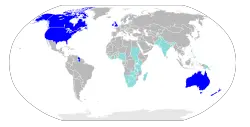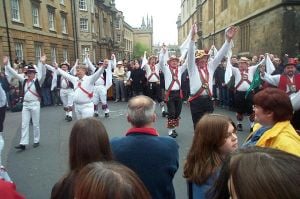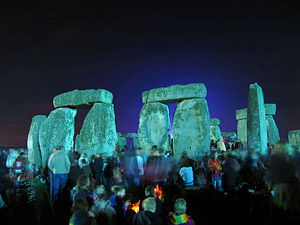Culture of England
The culture of England is sometimes difficult to separate clearly from the culture of the United Kingdom,[citation needed] so influential has English culture been on the cultures of the British Isles and, on the other hand, given the extent to which other cultures have influenced life in England.
Art

English art is the body of art originating from England. Nikolaus Pevsner attempted a definition in his 1956 book The Englishness of English Art.
It has developed over several millennia, to recent movements such as Brit Art, and now encompasses a variety of forms — painting, photography, sculpture and performance art.
It is often considered that English landscape painting typifies the tradition of English art, mirroring as it does the development of the country house and its landscaping. Famous English artists include JMW Turner and John Constable.
Cuisine
Despite Anglo-Saxon recipes having once been highly esteemed throughout Europe, England's culinary efforts were gradually neglected during successive periods of political and economic upheaval, culminating in the Second World War. England being the first industrialized country in the world, urbanised workers were in many cases cut off from regional food traditions and deprived of basic ingredients. Some consider that English cuisine has consequently suffered from a widespread image of blandness and lack of distinctiveness. The openness of English diners to exotic dishes has also meant that English cooking does not enjoy as high a profile as other nations' culinary traditions. More recently, a new style of cooking called Modern British has emerged that combines traditional British ingredients with foreign culinary influences.
The Full English breakfast remains an enduring tradition for many, despite the increasing popularity of the continental-style breakfast, or no breakfast at all, for busy workers. Tea and beer are typical and rather iconic drinks in England, particularly the former. Cider is produced in the West Country, and the south of England has seen the reintroduction of vineyards producing high quality white wine on a comparatively small scale.
England produces hundreds of regional cheeses, including:
- Cheddar cheese
- Stilton cheese
- Wensleydale cheese
- Lancashire cheese
- Dorset Blue Vinney cheese
- Cheshire cheese
- Double Gloucester cheese
- Red Leicester
- Blue cheese
- Lincolnshire Poacher
Other English dishes include:
- Sunday roast
- Lancashire hotpot
- Cornish pasty
- Spotted dick
- Mince pie
- Fish and chips (and mushy peas)
- Worcester sauce
- Clotted cream from Devon and Cornwall
- Yorkshire pudding
- Sausage and mash
- Eccles cake
- Scones
- Shepherd's pie
- Cumberland sausage
- Lincolnshire sausage
- British curries
- Balti
- Chicken tikka masala
- Apple pie
- Knickerbocker glory
- Other typical British dishes
Folklore
English folklore is the folk tradition which has evolved in England over a number of centuries. Some English legends can be traced back to their roots, even as far as before the Roman invasion of Britain, while the origin of others is fairly uncertain or disputed. England abounds with folklore, in all forms, from such obvious manifestations as the traditional semi-mystical Arthurian legends and semi-historical Robin Hood tales, to contemporary urban myths and facets of cryptozoology such as the Beast of Bodmin Moor.
Morris dance and related practices such as the Abbots Bromley Horn Dance preserve old English folk traditions, as do Mummers Plays. The utopian vision of a traditional England is sometimes referred to as Merry England.
Heritage
Stonehenge is believed by many English people and foreigners alike to hold an iconic place in the culture of England. Other built structures such as cathedrals and parish churches are associated with a sense of traditional Englishness, as is often the palatial 'stately home'; a notion established in part by English author Jane Austen's work Pride and Prejudice. The English country house and the rural lifestyle forms an interest among many people as typified by visits to properties managed by English Heritage or the National Trust.
Landscape gardening as developed by Capability Brown set an international trend for the English garden. Gardening, and visiting gardens, are regarded as typically English pirsuits, fuelled somewhat by the perception of England as a nation of eccentric ameteurs and autodidacts. In many, usually rural places, people gather for May Day festivals on the 1st of May to celebrate "the awakening of the flowers" - the beginning of summer. This traditionally involves the local schoolchildren skipping around a maypole - a large pole erected on the village green (historically a tree would have been specially cut down) - each carrying a coloured ribbon, resulting in a multi-coloured plaited pattern. The festival traditionally features Morris dancing and various festivities, culminating in the crowning of a 'May Queen' - a pupil from the local school. Many regional variations of the festivals exist, including the Rochester Sweeps' Festival and the "'Obby 'Oss" festival of Padstow, which is the oldest May Day festival still practised today, dating back to the 14th century.
- Historic houses in England
- English Heritage Properties in England
- List of National Trust properties in England
Literature
The term English literature refers to literature written in the English language, or literature composed in English by writers who are not necessarily from England. Writers noted for expressing Englishness, or associated particularly with regions of England, include William Shakespeare, Charles Dickens, Thomas Hardy (Wessex), A. E. Housman (Shropshire), Rupert Brooke, Jane Austen, Arnold Bennett and the Lake Poets (Lake District).
- List of English novelists
- Anglo-Saxon literature
- Elizabethan theatre
- Big six in the romantic literature of England
Music
England has a long and rich musical history. The United Kingdom has, like most European countries, undergone a roots revival in the last half of the 20th century. English music has been an instrumental and leading part of this phenomenon, which peaked at the end of the 1960s and into the 1970s.
The achievements of the Anglican choral tradition following on from 16th century composers such as Thomas Tallis, John Taverner and William Byrd have tended to overshadow instrumental composition. The semi-operatic innovations of Henry Purcell did not lead to a native operatic tradition, but George Frederick Handel found important royal patrons and enthusiastic public support in England. The rapturous receptions afforded by audiences to visiting musical celebrities such as Haydn often contrasted with the lack of recognition for home-grown talent. However, the emergence of figures such as Edward Elgar and Arthur Sullivan in the 19th century showed a new vitality in English music. In the 20th century, Benjamin Britten and Michael Tippett emerged as internationally-recognised opera composers, and Ralph Vaughan Williams and others collected English folk tunes and adapted them to the concert hall. Cecil Sharp was a leading figure in the English folk revival.
Finally, a new beat out of Liverpool emerged in 1962. The Beatles: John Lennon, Paul McCartney, George Harrison, and Ringo Starr, became the world's most popular musicians of their time. The "Fab Four" opened the doors for British acts such as The Rolling Stones, The Who, Queen, Iron Maiden, Black Sabbath, Led Zeppelin and Pink Floyd to the globe.
Some of England's leading contemporary artists include Elton John, George Michael, Blur, The Spice Girls, Arctic Monkeys, Robbie Williams, Oasis, Radiohead, David Bowie, Coldplay and Muse.
Religion
- Further information: Religion in the United Kingdom, Medieval Religion in England, Church of England, Anglicanism and English Reformation
Ever since the break with the Roman Catholic Church in the 16th century, the English have predominantly been members of the Church of England, a branch of the Anglican Communion, a form of Christianity with elements of Protestantism and Catholicism. The Book of Common Prayer is the foundational prayer book of the Church of England and replaced the various Latin rites of the Roman Catholic Church.
Today, most English people practising organised religion are affiliated to the Church of England or other Christian denominations such as Roman Catholicism and Methodism (itself originally a movement within the Anglican Church). In the 2001 Census, a little over 37 million people in England and Wales professed themselves to be Christian. Jewish immigration since the 17th century means that there is an integrated Jewish English population, mainly in urban areas. 252,000 Jews were recorded in England & Wales in the 2001 Census; however this represents a decline of about 50% over the previous 50 years, caused by emigration and intermarriage.[citation needed] Immigration to Britain from India and Pakistan since the 1950s means that a large number of people living in England practise Islam (818,000), Hinduism (467,000), or Sikhism (301,000); however, the census shows that adherents to these religions are more likely to regard themselves as British than English.[1] The 2001 census also revealed that about seven million people, or 15% of English people, claim no religion. [2]
The Church of England functions as the established church in England. Both the Church of England and the Catholic Church in England and Wales trace their formal history from the 597 Augustinian mission to the English. Other churches which have started in England include the Methodist church, the Quakers and the Salvation Army.
Contribution to humanity
In the opinion of English philologist J. R. R. Tolkien, the early medieval Anglo-Saxon mission to the Frankish Empire was "among our chief contributions to Europe, considering all our history".
The English have played a significant role in the development of the arts and sciences. Prominent individuals have included the scientists and inventors Isaac Newton, Francis Crick, Abraham Darby, Michael Faraday, Charles Darwin, Joseph Swan and Frank Whittle; the poet and playwright William Shakespeare, the novelists Jane Austen, Charles Dickens, Virginia Woolf and George Orwell , the composers Edward Elgar and Benjamin Britten, and the explorer James Cook. English philosophers include Francis Bacon, John Locke, Thomas Hobbes, Thomas Paine, Jeremy Bentham, John Stuart Mill and Bertrand Russell.
English law has also formed the basis for common law legal systems throughout the world.[3]
The rules for many modern sports including football, rugby (union and league), cricket and tennis were first formulated in England.
Language
- Further information: English language, English English and British English

English people traditionally speak the English language, a member of the West Germanic language family. The modern English language evolved from Old English, with lexical influence from Norman-French, Latin, and Old Norse. Cornish, a Celtic language originating in Cornwall, is currently spoken by about 3,500 people. Historically, another Brythonic Celtic language, Cumbric, was spoken in Cumbria in North West England, but it died out in the 11th century although traces of it can still be found in the Cumbrian dialect. Because of the 19th century geopolitical dominance of the British Empire and the post-World War II hegemony of the United States, English has become the international language of business, science, communications, aviation, and diplomacy. English is the native language of roughly 350 million people worldwide, with another 1.5 billion people who speak it as a second language.[citation needed]
Symbols
The English flag is a red cross on a white background, commonly called the Cross of Saint George. It was adopted after the Crusades. Saint George, later famed as a dragon-slayer, is also the patron saint of England. The three golden lions on a red background was the banner of the kings of England derived from their status as Duke of Normandy and is now used to represent the English national football team and the English national cricket team, though in blue rather than gold. The English oak and the Tudor rose are also English symbols, the latter of which is (although more modernised) used by the England national rugby union team.
England has no official anthem; however, the United Kingdom's "God Save the Queen" is currently used. Other songs are sometimes used, including "Land of Hope and Glory" (used as England's anthem in the Commonwealth Games), "Jerusalem", "Rule Britannia", and "I Vow to Thee, My Country". Moves by certain groups are encouraging adoption of an official English anthem following similar occurrences in Scotland and Wales[4][5].
Sport and leisure
There are many sports codified by the English, which then spread worldwide due to trading and the British Empire, including badminton, cricket, croquet, football, field hockey, lawn tennis, rugby league, rugby union, table tennis and thoroughbred horse racing.
England, like the other countries of the United Kingdom, competes as a separate nation in some international sporting events, especially those for football, cricket and rugby union. The England cricket team actually represents England and Wales[6].
Supporters are more likely to carry the Cross of Saint George flag whereas twenty years ago the British Union Flag would have been the more prominent. In an article in the Daily Mirror on 17 September 2005, Billy Bragg said "Watching the crowd in Trafalgar Square celebrating The Ashes win, I couldn't help but be amazed at how quickly the flag of St. George has replaced the Union Flag in the affections of England fans. A generation ago, England games looked a lot like Last Night of the Proms, with the red, white and blue firmly to the fore. Now, it seems, the English have begun to remember who they are."[7].
Association football, cricket, rugby union and rugby league are considered to be the national sports of England.
Football maintains a consistent popularity across the country and is often indicative of trends across wider culture in England, such as in clothing and music. The increase in hooliganism amongst football fans in the 1970s and 1980s can be in part attributed to a parallel rise in unemployment. As England, and the United Kingdom as a whole, returned to a more affluent and stable financial position in the late 1990s, violent football culture was transformed in to a culture where families were welcome, and nationalism lost its aggressive edge.
Different sports directly represent the different social classes within England. Rugby league, for instance, was traditionally associated with the old mill towns of north west England, whereas cricket and rugby union have their origins in the private schools of the 18th and 19th centuries respectively.
However, since the English Rugby World Cup victory in 2003, the sport has seen a revival in widespread popularity across the class system. Likewise, after the Ashes victory of 2005, cricket has regained much of the popularity it had lost throughout the 1990s.
Tennis is also one of England's major sports. This can be seen through one of the most prestigious tournaments in tennis, Wimbledon, being held in England.
External links
Credits
New World Encyclopedia writers and editors rewrote and completed the Wikipedia article in accordance with New World Encyclopedia standards. This article abides by terms of the Creative Commons CC-by-sa 3.0 License (CC-by-sa), which may be used and disseminated with proper attribution. Credit is due under the terms of this license that can reference both the New World Encyclopedia contributors and the selfless volunteer contributors of the Wikimedia Foundation. To cite this article click here for a list of acceptable citing formats.The history of earlier contributions by wikipedians is accessible to researchers here:
The history of this article since it was imported to New World Encyclopedia:
Note: Some restrictions may apply to use of individual images which are separately licensed.
- ↑ Ethnicity and Identity: Religion, National Statistics, 21 March, 2005.; Identity, National Statistics, 21 March, 2005.
- ↑ 2001 National Census pp. England , Ethnicity and Religion. National Statistics (2001). Retrieved 2007-08-05.
- ↑ Common Law by Daniel K. Benjamin, A World Connected' website. Retrieved 16 September 2006.
- ↑ Anthem 4 England - English National Anthem
- ↑ Anthem for England
- ↑ "England Cricket Team Profile". Retrieved 2006-09-13.
- ↑ "The Saturday Soap Box: We have to make Jerusalem England's national anthem", Daily Mirror, 2005-09-17. Retrieved 2006-11-01.


